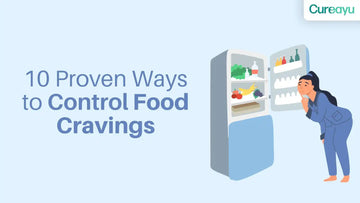In our modern environment, we are constantly bombarded with delicious and convenient food options, making it challenging to resist the temptation to indulge in cravings. Whether it's the aroma of freshly baked pastries wafting from a nearby café or the sight of colorful candy displays at the grocery store checkout, our surroundings often trigger intense desires for certain foods.
Despite the constant allure of tempting foods, we hold the power to shape our eating habits. Through targeted strategies and mindful decision-making, we can resist impulsive cravings. By assessing hunger levels, planning meals, and seeking non-food coping mechanisms for stress or boredom, we reclaim control over our health and well-being.
Ultimately, mastering the art of taming food cravings is about empowering ourselves to make informed choices that align with our personal goals and values. It's a journey that requires patience, self-awareness, and a willingness to experiment with different strategies until we find what works best for us. But with dedication and perseverance, we can overcome the challenges posed by food cravings and cultivate a healthier, more balanced relationship with food.
What Is Food Craving
Food cravings can be a compelling urge that feels nearly impossible to ignore, drawing us irresistibly towards certain foods that promise instant gratification or comfort. They often stem from a complex interplay of psychological, physiological, and environmental factors, making them a formidable challenge to overcome. Whether it's the nostalgic aroma of a favorite childhood dish or the stress-relieving allure of a sweet treat, these cravings can hijack our best intentions and derail our efforts towards maintaining a balanced diet. As such, understanding the underlying triggers of food cravings and implementing effective strategies to manage them is essential for promoting healthy eating habits and overall well-being.
Also Read: Enriching Benefits of Amla: The Miracle Fruit of Ayurveda
Risks Associated with Frequent Food Cravings
Weight Gain from Caloric Surplus
Frequent food cravings often lead to consuming more calories than the body needs, resulting in weight gain over time. This surplus of calories, especially if derived from unhealthy or high-calorie foods, contributes to the accumulation of excess body fat.
Elevated Risk of Chronic Diseases
Continuous indulgence in food cravings is linked to an increased likelihood of developing chronic health conditions such as diabetes and heart disease. Diets high in refined sugars, saturated fats, and processed foods, often favored during cravings, can contribute to inflammation, insulin resistance, and cardiovascular problems.
Nutritional Imbalance and Deficiencies
Persistent food cravings may disrupt balanced nutrition by promoting the consumption of calorie-dense but nutrient-poor foods. This can lead to deficiencies in essential vitamins, minerals, and other micronutrients crucial for optimal health and functioning of the body's systems.
Negative Impact on Mental Well-being
Frequent episodes of overeating driven by food cravings can take a toll on mental health, causing feelings of guilt, shame, or loss of control. These negative emotions may exacerbate stress and contribute to disordered eating patterns, perpetuating a cycle of unhealthy behavior.
Fluctuations in Energy Levels and Productivity
Consuming foods high in sugar or refined carbohydrates in response to cravings can cause rapid spikes and subsequent crashes in blood sugar levels. These fluctuations can leave individuals feeling fatigued, irritable, and less mentally alert, ultimately impairing productivity and daily functioning.
Also Read: The Top 10 Vegan Protein Sources
How to Control Food Cravings
1. Mindful Eating: Pay attention to your body's hunger and fullness cues to distinguish between true hunger and cravings driven by emotions or external cues.
2. Stay Hydrated: Dehydration can sometimes masquerade as hunger. Keep a water bottle handy and aim to drink at least eight glasses of water a day.
3. Balanced Meals: Include a combination of protein, healthy fats, and fiber-rich carbohydrates in your meals to promote satiety and stabilize blood sugar levels.
4. Plan Ahead: Prepare healthy snacks and meals in advance to avoid impulsive decisions when hunger strikes.
5. Stress Management: Practice stress-reducing techniques such as meditation, deep breathing exercises, or yoga to prevent emotional eating triggered by stress.
6. Get Adequate Sleep: Lack of sleep can disrupt hunger hormones, leading to increased cravings for high-calorie foods. Aim for 7-9 hours of quality sleep each night.
7. Identify Triggers: Recognize situations, emotions, or environments that trigger your cravings and develop strategies to address them effectively.
8. Distract Yourself: Engage in activities that keep your mind occupied and away from food cravings, such as going for a walk, reading a book, or calling a friend.
9. Practice Portion Control: Allow yourself to enjoy your favorite foods in moderation, but be mindful of portion sizes to prevent overindulgence.
10. Seek Support: Surround yourself with a supportive network of friends, family, or a professional counselor who can offer encouragement and guidance on your journey to managing food cravings.
Also Read: Honey Harmony: Delving into Unique Benefits Of Honey
Conclusion
While food cravings may seem like a formidable foe, armed with the right tools and strategies, you can conquer them and reclaim control over your eating habits. By practicing mindfulness, prioritizing self-care, and seeking support when needed, you can pave the way for a healthier relationship with food and ultimately achieve your wellness goals. Remember, it's not about perfection but progress, one step at a time. So here's to embracing the journey towards a balanced and fulfilling lifestyle!








